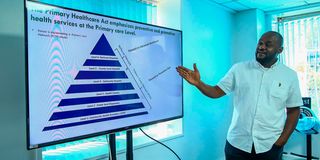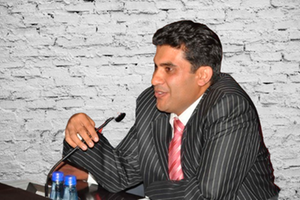
Cabinet Secretary for Public Service and Human Capital Development Justin Muturi (right) and Principal Secretary Amos N. Gathecha when they appeared before the Senate Committee on Labour and Social Welfare at the Bunge Tower Nairobi on March 4, 2025.
Public Service Cabinet Secretary Justin Muturi on Tuesday stressed that he had urged caution in the manner in which a contract for the Sh104 billion health system developed by a consortium led by Safaricom was executed.
The Ministry of Health has daily been depositing millions of shillings collected from Kenyans enrolled in the State health scheme to a secret account run by three companies contracted to operate the system.
Safaricom PLC, Konvergenz Solutions and Apiero Limited, which were contracted to establish the Sh104.8 billion Integrated Healthcare Information Technology System (IHTS), have been receiving, in the escrow account, remittances after Kenyans register for the Social Health Insurance Fund (SHIF).
During his tenure as the immediate former Attorney- General, Mr Muturi, when consulted about the setting up of the escrow account through which the money would be funnelled, had advised the Health ministry and its partners to proceed with caution.
Mr Muturi had cited the Public Finance Management Act dictated that all the money raised or received by the government shall be deposited in the Consolidated Fund and can only be used with the permission of the Controller of Budget.
“We note that clause 12.1 stipulates the signing of an escrow agreement between the procuring entity and the consortium for purposes of setting up an escrow account through the escrow agent,” Mr Muturi had told Medical Services Principal Secretary Harry Kimtai on May 13, last year.

Mr Job Nyameino, Chief Engineer and Lead of the Safaricom Health Team, explains the Integrated Healthcare Information System (IHTS) Safaricom is developing for SHA at Safaricom Care Center, Westlands Nairobi on October 18, 2024.
“We advise the ministry to seek concurrence with National Treasury on the financial implications of this clause pursuant to the provisions of the Public Finance Management Act,” the AG directed then.
Konvergenz Solutions
He was referring to a clause in the updated contract signed between the Health ministry, Safaricom, Konvergenz Solutions and Apeiro, a shell company based in Abu Dhabi, United Arab Emirates
“The parties will, pursuant to the escrow agreement, jointly issue instructions to the escrow agent to set up an account to be held in the name of the escrow agent,” reads clause 12.
“The procuring entity will immediately upon commencement of registration and payments by end users of the system transfer or procure the transfer to the escrow account of such amount as necessary to enable it meet its present and future payment obligations,” the contract reads.
“Transfer of escrow deposits as aforesaid shall be undertaken on a daily basis and in any event at a frequency of not less than a week,” adds clause 12.4 of the contract.
The CS, when contacted by Nation, emphasised that he had urged caution.
“As can be discerned from our advisories we urged caution at every turn in order to ensure the input of every relevant player in the process,” Mr Muturi told Nation.
An escrow account is a financial agreement where a third party (neutral) holds funds or assets until certain conditions are met. The third party, known as an escrow agent, releases the funds or assets when the conditions are met.
Official documents obtained by Nation disclose that the money collected from millions of Kenyans is split to each member’s responsibility matrix.

The acting CEO Social Health Authority (SHA) Robert Ingasira when he appeared before the National Assembly Departmental Committee on Health at Parliament Buildings Nairobi on Wednesday, February 19, 2025.
According to project consortium agreement signed by the three parties, Apeiro will receive Sh57 billion, Safaricom Sh21 billion and Konvergenz Sh17.2 billion.
The latest development also explains why SHIF remittances are being wired to a different pay bill and not the single pay point for all government services as ordered by President William Ruto in August last year.
Health ministry officials have explained the decision that saw Kenya Commercial Bank (KCB), Sidian Bank, Co-operative Bank, Equity Bank, ABSA and Diamond Trust Bank (DTB) selected for Social Health Authority (SHA) collection accounts where employers began remitting contributions was reached by the SHA board after consulting employers.
Central Bank of Kenya
“We spoke to employers who told us where they prefer to be making the payments from and ensured that the banks are first approved and licensed by the Central Bank of Kenya (CBK). We also have our own paybill number for individuals who wish to pay, they can pay staff contributions via M-Pesa to help flatten the curve,” SHA chairperson Dr Abdi Mohamed told Nation in a past interview.
Acting SHA CEO Robert Ingasira explained that the money they collect from Kenyans on a daily basis is what they use to pay healthcare facilities.
“We have so far paid over Sh6 billion we owed healthcare facilities and will continue to do so,” Ingasira said.
The latest development adds to the controversy that has been stalking the new system whose rollout was reportedly rushed.
Questions have been raised why the government rolled out the Social Health Insurance Fund (SHIF) three months after signing a deal with the consortium led by Safaricom for the IHTS system that was to be developed over two years.
According to another senior official at the Digital Health Agency (DHA), when the IHTS system went live in October last year, only five out of 17 components were ‘functioning though they were not at 100 per cent.’
Price variations have also been questioned as Safaricom had initially agreed to do the project for Sh48 billion but the cost ballooned to Sh104 billion with the entry of the other partners.
According to the official documents in Nation’s possession, the ‘build up negotiations’ between Safaricom and the government commenced in June last year and are highlighted in official minutes of correspondences between then Health CS Susan Nakhumicha and her then Treasury counterpart Prof Njuguna Ndung’u.
“The medical equipment supply project aligns with Kenya Kwanza’s manifesto, especially with respect to achieving Universal Healthcare. By leveraging on the expertise and resources provided, we can enhance the accessibility and quality of healthcare services across the country,” Ms Nakhumicha explained to Prof Ndung’u on June 6, 2023 while requesting for Specially Permitted Procurement (SPP), a procedure that had never been used before in the country.
Prof Ndungu agreed to the idea on condition that the Health ministry drafted specific conditions for tendering and contracting a strategic partner and sharing with his office before embarking on the project.
“We anticipate you will expedite the process,” the then Treasury CS told his Health colleague on June 13, last year.
On June 19, PS Kimtai responded to Prof Njuguna.
“The Ministry intends to engage Safaricom PLC as a strategic investor partner to develop and deploy the Health Care Information system without the ministry incurring the heavy upfront capital cost required of the system,” the PS wrote, giving Safaricom a clean bill of health to proceed in executing the tender after the deal was finalised in July 2024.
“Our attached financial proposal is for the amount of Sh34,0030483,013 (for initial investment cost in two years), Sh70,804,653,465 (investment amount- 10 years inclusive of the two years initial investment cost) and Sh104,808,136,478 (total 10 years) inclusive of all taxes,” Safaricom told government while submitting its 745-page technical proposal developed in four days.
Safaricom touted its MPesa success and the credentials of its partners to persuade the government to hand the Sh 104.8 billion deal to the consortium led by the telco.
“Apiero is a fully owned entity of Sirius holding and has over 25 subsidiaries, 3000 employees and a global presence in over 20 countries. Our parent company IHC is the largest UAE company with over $250 billion market capitalization and 479 subsidiaries across 9 industries,” read some documents used to pitch the project to the government.







